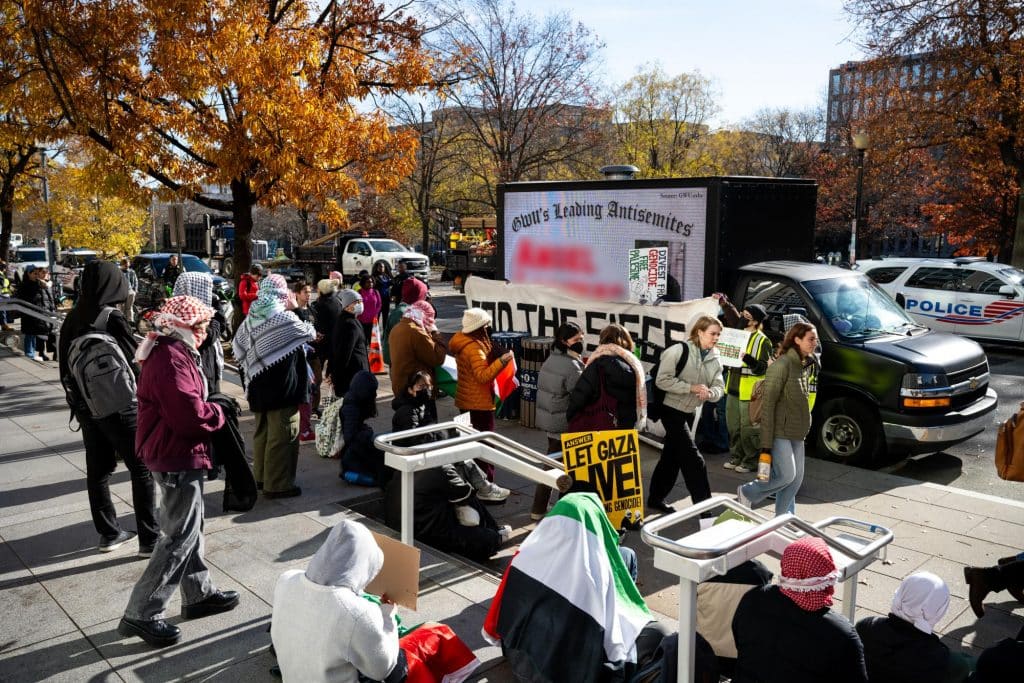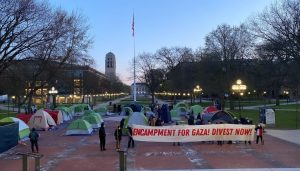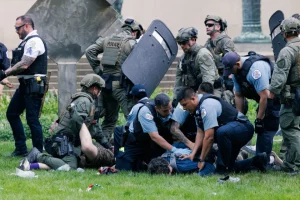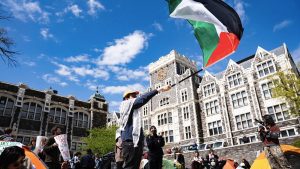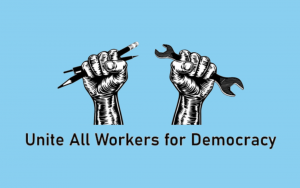“How CUNY became America’s most anti-Semitic university.” This headline from the New York Post is part of the newspaper’s unceasing coverage of supposed antisemitism at CUNY, from the attacks on CUNY Law School student commencement speaker Fatima Mohammed and newly hired CUNY Graduate Center professor Marc Lamont Hill to articles that parrot the doxing of anti-Zionist student organizers by websites such as stopantisemitism.org and Canary Mission. CUNY, however, is not an antisemitic university; it is, rather, at the forefront of a manufactured moral panic around campus antisemitism.
The panic centers on the myth of campus antisemitism, which rests on the false premises that universities are anti-Zionist institutions and that anti-Zionism is antisemitic. Those who propagate this moral panic largely ignore the antisemitism of right-wing campus organizations and centers. Yet the solutions to this “crisis,” presented by politicians and administrators, namely policing and criminalization, are all too real, with violent material consequences for the most precarious people in the university. Adjunct professors have been fired from their positions, students have lost job offers, three Palestinian students were shot in Vermont, and politicians such as Marco Rubio have threatened to deport international students who support Palestinian liberation. Biden’s White House has also said that “DHS and DOJ have taken steps to ensure campus law enforcement is included in engagements with state and local law enforcement and have taken numerous steps to provide outreach and support directly to campuses.” At CUNY, the chancellor has brought additional police onto campus in spaces where Arab, Muslim, and Jewish students gather, bolstered by $75 million in police funding from Governor Hochul to fight antisemitism. This continues a long history of using campus police to suppress student organizing and violate students’ free speech rights, including those of students at Brooklyn College and other universities in the wake of 9/11.
This campus antisemitism moral panic builds on two seemingly oppositional crises, one rooted in liberalism and the other in the politics of the Right. This convergence of liberal and right-wing forces is critical to understanding the politics of the current conjuncture.
The liberal origins of this moral panic, like that of the antisemitism scare more broadly, are in an understanding of racism that focuses on individual acts of hate rather than structural and systemic oppression. In response to an increase in racist and xenophobic violence against Asian people, including a 2021 attack in Atlanta where a man murdered poor and working-class women in the spas where they worked, the legislatures created a litany of hate crime laws under the pretense of stopping Asian/AAPI hate. Similarly, Dylann Roof was charged with a barrage of hate crime laws after he murdered nine Black people in an AME Church in Charleston. After the rebellions during the summer of 2020, where tens of millions of people took to the streets to proclaim that Black Lives Matter, many of whom articulated a structural critique of policing as racist violence work and demanded that the state defund the police and invest in communities, the liberal establishment sought to pacify the movement and incorporate its power into the carceral state by empowering the legal system to police itself and punish racist “bad apples” like Derek Chauvin. Under the hate crime framework, the problem is hateful, racist individuals, and the solution is criminalization and the strengthening and entrenchment of a carceral system savvy to the logics of diversity, equity, and inclusion. Liberal solutions to oppression, including antisemitism, do nothing to address the underlying causes of oppression and in fact expand the very systems that maintain oppression under the false premise of fighting bigotry. Abolition offers us an alternative framework to build safety outside of policing, and to make universities into life-affirming institutions for all students and community members. Surveilling students and workers won’t make Jewish community members safer, and it will put everyone in greater danger from police violence and retribution from the university, which will likely target workers and Black, Palestinian, Muslim, and Arab students.
The new moral panic’s right-wing origins are in a manufactured outrage around education. This previous moral panic, which targets institutions such as libraries (for hosting drag story hours) and schools (for teaching critical race theory), as well as universities, uses reactionary identity politics to perpetuate an assault on public education. Decrying safe spaces, ethnic and gender studies programs, trigger warnings, and the #MeToo movement for making campuses unsafe and hostile to white men, the right has managed to galvanize power for major overhauls of the New College of Florida and West Virginia University, as well as efforts to undermine tenure, affirmative action, academic freedom, and labor organizing on countless campuses. This foundational moral panic allowed the Right to smear calls for decolonization and Palestinian liberation as attacks not only on Western civilization but also on White Jewish students and the very whiteness of the university.
One goal of this moral panic is to make a specific set of political positions seem natural and taken for granted. This includes the notions that Israel has a right to exist and a right to defend itself, and that Hamas is an evil, antisemitic terrorist organization that commits acts of unjustifiable and barbaric violence and must be condemned. It also encompasses an effort to equate anti-Zionism and antisemitism, a position taken by the House of Representatives and pushed for on campus as universities adopted the IHRA definition of antisemitism. The moral panic naturalizes the notion that criticizing Israel is antisemitic hate speech and signals support of Hamas and terrorism. University leaders, including CUNY chancellor Matos Rodriguez and Brooklyn College president Michelle Anderson, as well as administrators at Columbia and Cornell, are using this antisemitism scare in an attempt to silence speech that deviates from the dominant Zionist agenda. Ironically, university administrators are not going far enough in their suppression of Palestinian organizing for the Zionist lobby. Three university presidents were recently called in front of Congress and questioned about their policies relating to speech calling for the genocide of Jews, and the president of Penn has already resigned as a result. It is important for the Zionist project to make these political positions seem natural — to create a new common sense. This allows them to label calls for Palestinian liberation “from the river to the sea” as outside the political mainstream and the domain of acceptable thought, speech, and action, allowing Zionists to carry out campaigns of censorship, doxing, and criminalization, on and off campus.
This crisis is being manufactured by a well-organized and funded Zionist political lobby. Doxing trucks have escalated the strategy of Canary Mission to scary new heights. Language that mirrored that of the ADL and condemned Students for Justice in Palestine passed through the U.S. Senate unanimously. This was echoed by White House press secretary Karine Jean-Pierre in a statement that compared Palestinian student organizing to the 2017 Unite the Right rally in Charlottesville where a white supremacist killed Heather Heyer.
This campus antisemitism moral panic is an abhorrent weaponization of antisemitism. Its goal is to chill dissent to the U.S. war machine and the ongoing genocide in Gaza. But it will fail. Youth in the United States, including young Jews, are largely critical of Israel, and even in the face of doxing, arrest, allegations of terrorist sympathies, condemnation from their own university leaders, and police brutality on campus, students continue to turn out in large numbers to declare that Palestine will be free!


